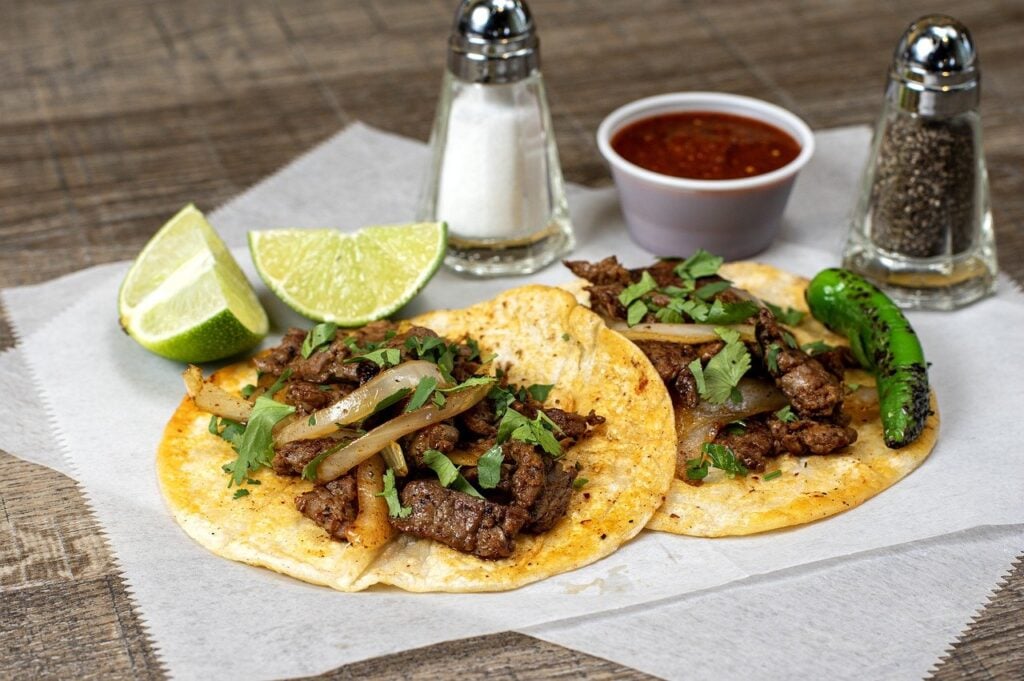Can Dogs Eat Corned Beef? A Vet’s Opinion

Corned beef is a salt-cured product frequently linked with St. Patrick’s Day food. It is typically produced from brisket. But can you feed corned beef to your dog?
Corned beef can be eaten by dogs in moderation, although it is not an ideal food for them. Corned beef has a lot of salt and fat, which can cause digestive problems and obesity in dogs. Furthermore, the additional spices and condiments may not agree with their sensitive stomachs. Giving basic, lean, and thoroughly cooked meats as occasional treats is ideal, ensuring they’re only a tiny part of their balanced diet. Always consult a veterinarian before introducing new items into your dog’s diet.
Benefits of corned beef for dogs
While some dogs may appreciate corned beef as an occasional treat, it is essential to note that it should not be a regular part of their diet. Corned beef has some possible advantages, but it also has substantial disadvantages. Here are some potential advantages and disadvantages:
- Protein: Corned beef contains the protein necessary for muscle upkeep and overall wellness in your dog.
- Taste: Corned beef may appeal to dogs, giving it a high-value treat for training or special occasions.
- Diversity: Offering tiny amounts of corned beef regularly can diversify your dog’s diet and encourage them to consume regular meals.
However, there are several disadvantages to eating corned beef:
- High sodium content
- Rich in fat
- Seasonings and seasonings
- Digestive upset
- Additives and preservatives
- Potential Allergens
As a responsible pet owner, you must prioritize your dog’s general health and feed them nutritionally balanced, dog-specific diets. Consider feeding your dog basic, fully cooked lean meats as a treat, or look into commercially available dog treats developed for canine nutrition. Always speak with your veterinarian before introducing new items into their diet to protect your dog’s safety and well-being.

How to safely give corned beef to dogs?
While corned beef can be given to dogs as a treat occasionally, it should be done with caution and moderation. Here are some suggestions for giving corned beef to your dog safely:
- Plain And Fully Cooked: Only feed your dog plain, fully cooked corned meat. Avoid offering them corned beef seasoned with spices, garlic, onions, or other substances that might be toxic to dogs.
- Trim Any Excess Fat: Before feeding corned beef to your dog, trim off any excess fat. In certain dogs, high-fat meals might cause pancreatitis or other digestive problems.
- Cut Into Small Pieces: Cut the corned beef into small, manageable pieces to make it easier for your dog to chew and digest. Large chunks may represent a choking hazard or be challenging for tiny dogs.
- Portion Control: Corned beef should only be served in tiny amounts as a treat. It should not be used in place of your dog’s regular, balanced meal, designed to suit their nutritional requirements.
- Avoiding Bones: Make sure the corned beef is boneless. Splintered cooked bones can cause internal injuries or obstructions.
- Check For Allergies: Before giving your dog corned beef, ensure they have no beef allergies or sensitivities. Observe their reaction to the treatment and discontinue if negative symptoms such as itching, vomiting, or diarrhea arise.
- One Ingredient Treat: Make homemade dog treats with just a tiny amount of basic, cooked corned beef and other safe ingredients such as carrots or sweet potatoes. You have more control over what goes into the treat this way.
- Feed In Moderation: Moderation is the key to safely feeding corned beef to your dog. While a moderate amount of simple, cooked corned beef occasionally is unlikely to hurt your dog, consuming high-fat, salty foods frequently can cause health problems.
- Consult Your Vet: Before introducing any new food to your dog’s diet, including corned beef, always visit your veterinarian. They can give personalized advice based on your dog’s health and dietary demands.
- Consider Healthier Alternatives: Instead of corned beef, offer healthier alternatives to your dog as treats. Lean, prepared meats such as chicken or turkey and specially manufactured dog treats are better options for gratifying your dog’s taste buds without jeopardizing its health.
Treats should only make up a small portion of your dog’s diet. A nutritionally complete, well-balanced dog food is critical for their long-term health and well-being.
Will corned beef make a dog sick?
Yes, corned beef can make a dog sick for a variety of reasons, including:
- High-Fat Content: Corned beef usually is high in fat, and eating a lot of fatty foods can cause pancreatitis in dogs, which is a painful and potentially fatal condition.
- Excessive Salt Consumption: Curing corned beef requires a substantial amount of salt, and dogs are more sensitive to salt than people. High salt consumption can result in sodium ion poisoning, which causes symptoms such as vomiting, diarrhea, drowsiness, and extreme thirst.
- Harmful Ingredients: Corned beef is frequently seasoned with garlic and onion, both harmful to dogs. These compounds can harm a dog’s red blood cells, resulting in anemia.
- Cooked Bones: If the corned beef contains bones, cooked bones might shatter and create blockages or internal injury in dogs if they consume it.
- Allergenic Protein: Some dogs are allergic to beef, which can cause skin irritation, itching, and stomach disorders.
- Digestive Upset: Sudden dietary changes or ingesting rich, fatty meals such as corned beef can trigger digestive discomfort, resulting in vomiting and diarrhea.
- Obesity Risk: Regular consumption of high-fat meals such as corned beef can contribute to obesity in dogs, which can lead to various health problems.
- Choking Hazard: Large chunks of corned beef or pieces containing bone fragments might cause choking in tiny dogs or dogs who gulp their food.
- Preservatives: Commercially cooked corned beef could have ingredients and preservatives that harm dogs.
While tiny amounts of plain, thoroughly cooked corned beef may not cause immediate harm in some dogs, it is critical to be aware of the risks and proceed with caution. Corned beef should not be given to a dog regularly, and any treat should be in moderation. If you suspect your dog has consumed corned beef or any other poisonous substance, contact your veterinarian immediately for guidance and treatment.
Can Dogs Eat Corned Beef Variations?
It’s crucial to clarify that corned beef variations often refer to various corned beef preparations or recipes rather than specific meat varieties. Due to the common ingredients used in its production, dogs should avoid most corned beef varieties. Following are some popular variations of corned beef that dogs shouldn’t eat:
- Spicy Corned Beef: Dogs should not eat corned beef spiced or seasoned with ingredients like garlic, onions, or other herbs. These compounds can be hazardous to dogs and result in digestive problems, anemia, and other conditions.
- High Sodium Corned Beef: Dogs are more sensitive to salt than people, and corned beef is heavily salted during curing. Dogs who consume corned beef heavy in salt risk developing sodium ion poisoning.
- Excessive Fat In Corned Beef: Corned beef frequently contains a lot of fat, and dogs who consume too much fat might get pancreatitis.
- Corned Beef With Bones: Dogs shouldn’t be given corned beef with bones since the cooked bones can splinter and result in internal injury or obstructions.
- Canned Corned Beef: Dogs should not consume canned corned beef since it frequently contains additives, preservatives, and high sodium levels.
- Processed Corned Beef: Deli-style or processed corned beef may include extra additives and preservatives that might harm dogs.
- Corned Beef Hash: Corned beef hash frequently includes other components like potatoes and occasionally onions harmful to canines.
- Sandwiches Or Wraps With Corned Beef: These frequently include components like bread, cheese, and condiments that dogs may be unable to eat.
While some dogs may be able to tolerate plain, thoroughly cooked, and unseasoned corned beef as an occasional treat, it’s essential to be aware of the potential health hazards connected with this cuisine. As a responsible pet owner, it is advised to refrain from giving dogs corned beef varieties in favor of safer, healthier treat options created just for canines. Before adding any new food to your dog’s diet, always check with your veterinarian to be sure it’s okay for them to eat.

Vet’s Summary
While dogs can have corned beef in moderation, the article stresses that there are several crucial variables to take into account. Since additional components like garlic and onion can be poisonous to dogs and potentially cause gastrointestinal irritation and anemia, plain, thoroughly cooked corned beef without spices or condiments is preferred. Due to its high fat and salt content, corned beef can cause dogs to become obese, develop pancreatitis, or become sodium ion poisoned. To avoid choking hazards and internal injuries, cooked bones should be avoided. Given these dangers, limiting the frequency you give your dog treats like corned beef and focusing on feeding them a healthy diet is suggested.
The owner may want to give their dog probiotic supplements to encourage a healthy digestive tract and overall well-being. Probiotics encourage the development of healthy gut flora, which helps to enhance immunity, improve digestion, and lessen digestive problems. Dogs occasionally have digestive discomfort from corned beef, especially when it is not a regular diet component. Thus, probiotics can preserve their gut health and balance their microbiome. Before introducing new supplements, a veterinarian should be consulted to ensure the probiotics are appropriate for the dog’s requirements and medical circumstances. Probiotics can be a beneficial supplement to support the dog’s digestive health and general vigor, in addition to a balanced diet and frequent exercise.
Videos to watch
If you are wondering what related foods are good to give your dog, watch this:
And if you want to know what a dog can NOT eat, watch this:






